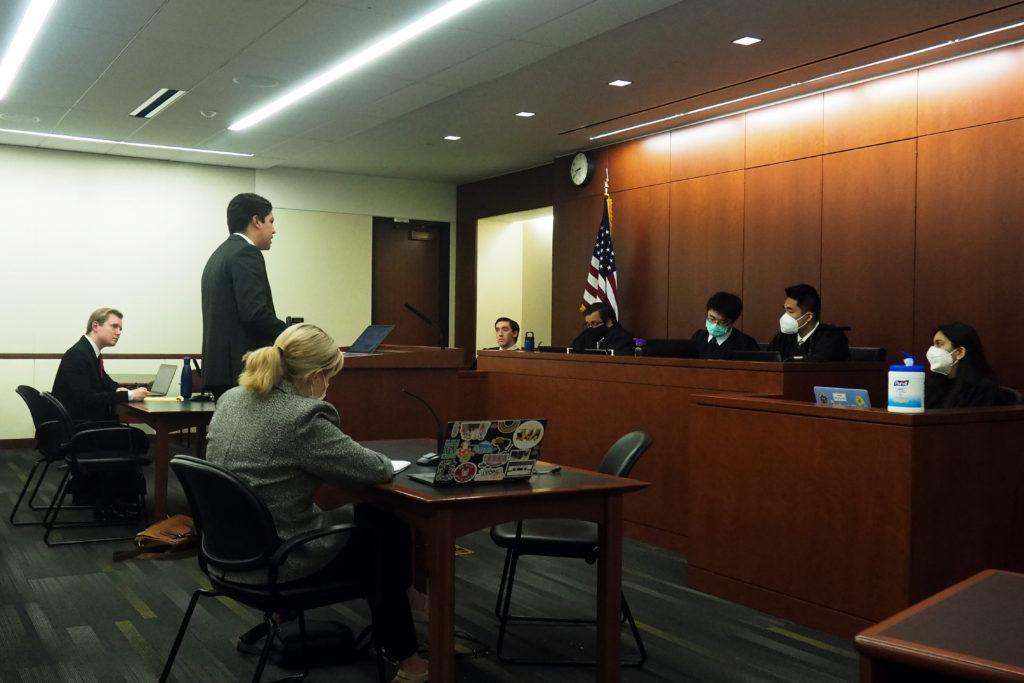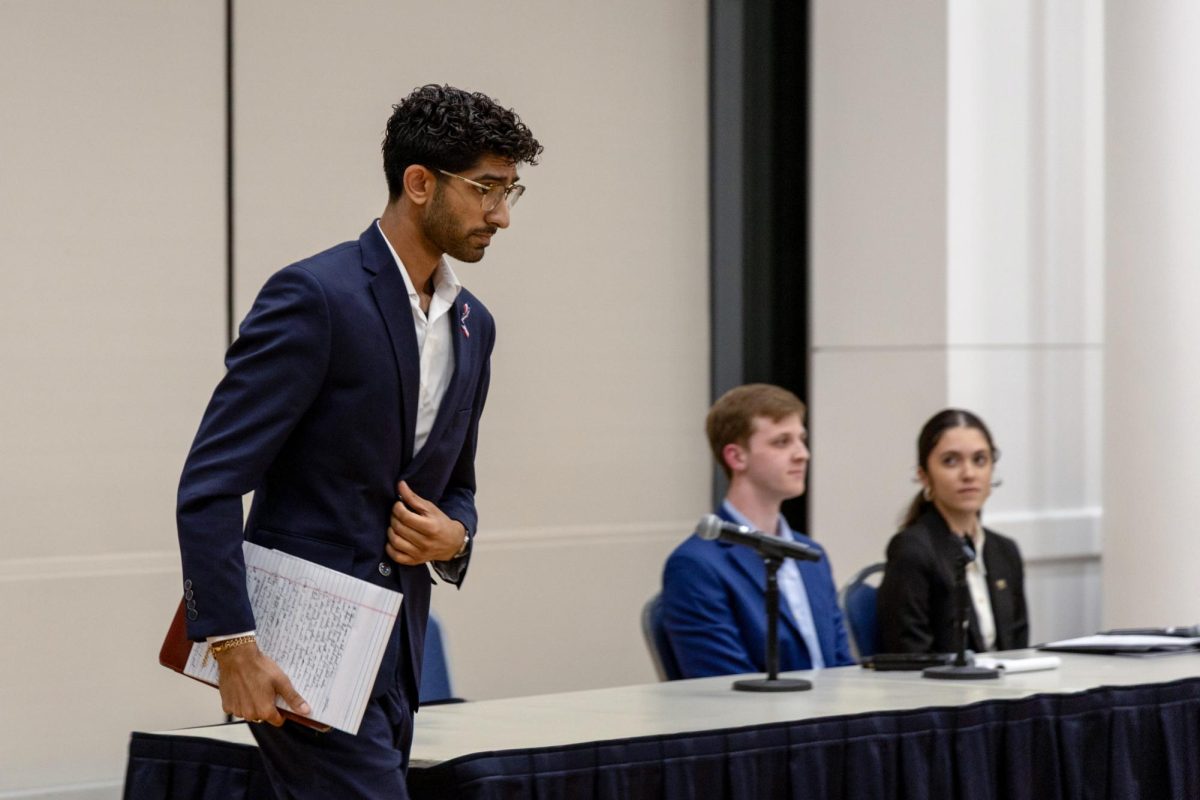Updated: May 2, 2022 at 3:56 p.m.
The Student Court struck down a Student Association bylaw that allowed the finance committee to sanction student organizations Sunday.
The SA Office of the Legislator General filed a lawsuit against the chair of the SA Senate’s finance committee in February opposing sections of the Financial Reorganization Act – a bill that amended the SA’s finance bylaws in December, allowing the finance committee to impose sanctions and fines on student organizations that break from SA finance policies. The court ruled in a 6-1 decision Sunday that only the SA’s executive branch – specifically the treasurer’s office – can sanction student organizations, invalidating the finance committee’s sanctioning power but keeping the other bylaw updates that define the parameters of the finance committee and set up general allocations.
“Our holding is based on our conclusion that the power to sanction is an executive power that properly lies within the Executive Branch—which Section 511 unconstitutionally vests in the Legislative Branch,” the decision states. “And we reiterate that the exercise of the sanctioning power must, at the very least, comply with the basic standards of due process guaranteed by the Constitution or otherwise identified by decisions of this court.”
Xu sponsored the Financial Reform Act in March in an effort to nullify the Student Court case. Senators unanimously passed the act to remove sanctioning power from the SA’s bylaws after June 30th, but the court found that the bill didn’t “render the plaintiffs’ challenge moot,” rejecting Xu’s bid to circumvent the court and extending the case until Sunday’s ruling.
The plaintiffs argued that the court should strike down the committee’s sanctioning power as unconstitutional but said the rest of the act should remain in place, which the court ultimately agreed with. Juan Carlos Mora, an assistant legislator general and a plaintiff, said the power to sanction student organizations lies solely within the executive branch, specifically the treasurer.
“While the Senate plays the primary role in moving the legislation and identifying what kind of conduct is unlawful in this case, the enumerated kinds of conduct, like political activity, like certain usage of equipment, then it’s up to the executive to be able to enforce this power,” he said in oral arguments last month.
Xu countered this and said that the finance committee will only theoretically be able to sanction student organizations until the power expires in July because of the updated legislation the senate passed, rendering the case irrelevant. He said that under his proposed sanction system, the senate and the court could have appealed any sanctioning decisions the finance committee made.
“The defendant believes that the treasurer should be acting as a prosecutor, the finance committee acting as a hearing panel,” he said. “The senate should be the first step to appeal, and the court will be the last resort to solve any dispute.”
The Office of Student Rights and Responsibilities can also sanction student organizations for violating the Code of Student Conduct and sanctioned student organizations can face punishments like suspension, censure and expulsion.
Xu said the University “must be involved” in all sanctioning processes, including the SA’s. He said because the SA receives funding from the University, the treasurer must discuss with officials throughout the sanctioning process to determine if an organization violated the Code of Student Conduct.
“If the University does not participate in this process, the treasurer has no way to learn all this information before it raises charges against student organization,” Xu said.
The court’s decision states the SA’s power to sanction demonstrates student autonomy and self-governance. In presentation of the judgement Sunday, Chief Justice Yun-Da Tsai said the University is not subject to the same limitations as the SA because “the Board of Trustees gives them an immense amount of power.”
“The fact of the matter is that once the SA has been given the power, so long as the University has not preempted the SA from exercising its power in those areas, it has been granted power,” he said.
The decision states that although the defense argues that there has never been a situation where the sanctioning powers within the SA were unclear, that does not mean there is not a question about the SA Constitution that the court needs to answer.
“To hold otherwise would sharply curtail this court’s review of duly enacted legislation in flagrant contravention of the constitution’s grant of judicial power and this court’s solemn duty and responsibility to hear cases plainly falling within our jurisdiction,” the decision states.
Associate Justice Fatmah Noredin, who wrote the dissenting opinion, said the treasurer and the finance committee are inherently involved in the sanctioning process, so they should share the power to sanction with the executive branch.
“I believe that the sanctioning power can be shared among the branches,” she said.
The court’s majority decision states the treasurer must follow the existing rules having to do with SA funding and sanctioning, and the treasurer must “timely notify” any organizations they sanction. The decision declares the finance committees’ sanctioning power as ”unconstitutional and invalid for all purposes,” and it revises any sanctions administered under SA bylaws.
“Our decision here today reiterates the responsibility of the Student Association to police the disbursement and use of Student Association funds, abide by the fundamental organizational principles provided in the governing documents of the Student Association, and afford registered student organizations the basic due process necessary for fair and just exercise of the sanctioning power,” the decision stated.
This post was updated to correct the following:
The Hatchet incorrectly reported the decision to invalidate the finance committee’s sanctioning power was decided with a 5-2 vote. That question was decided with a 6-1 vote, with Noredin dissenting. Associate Justice Devin Eager concurred with the decision to invalidate the sanctioning finance committee’s sanctioning power, but dissented from the court when he argued the court should also invalidate the two pieces of related SA legislation.
The Hatchet also incorrectly spelled the name of Chief Justice Yun-Da Tsai. It is now spelled correctly.
We regret these errors.







